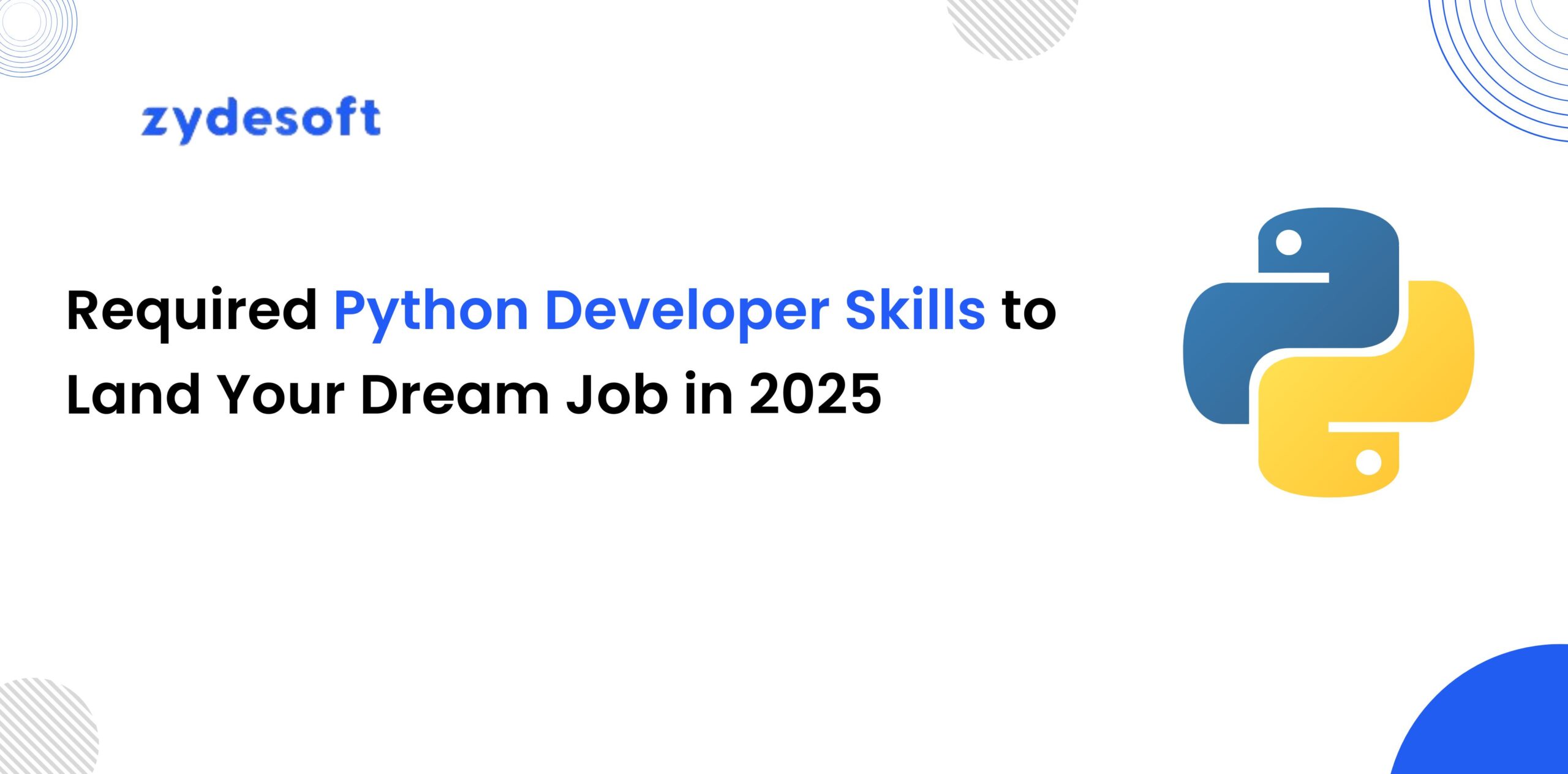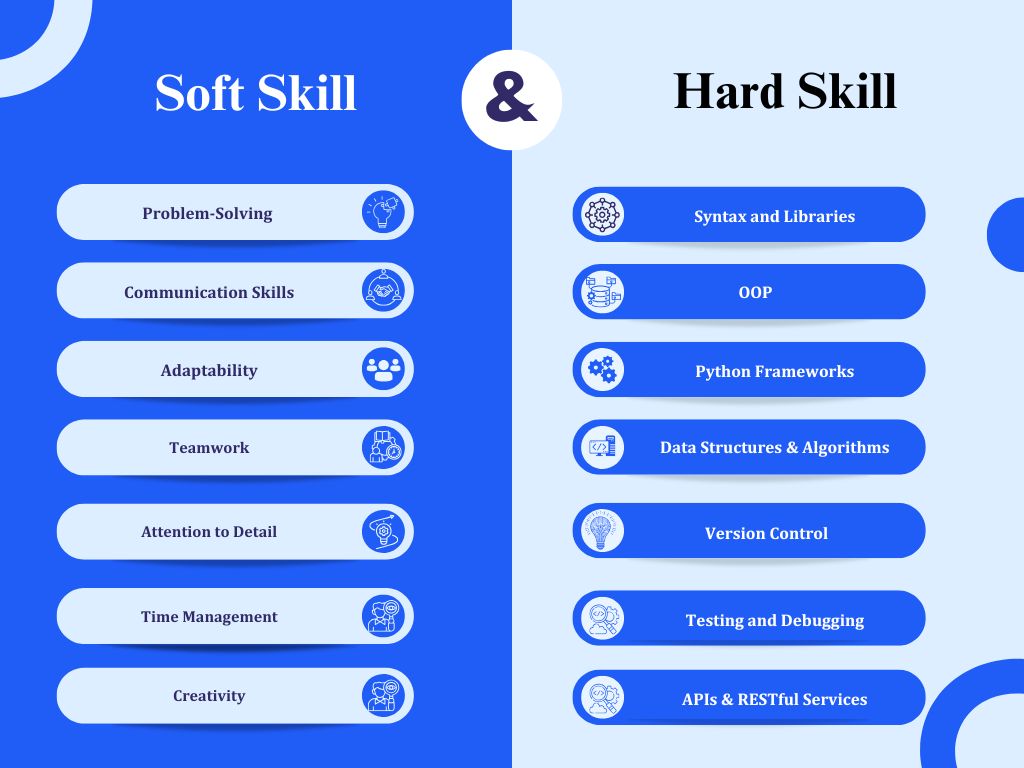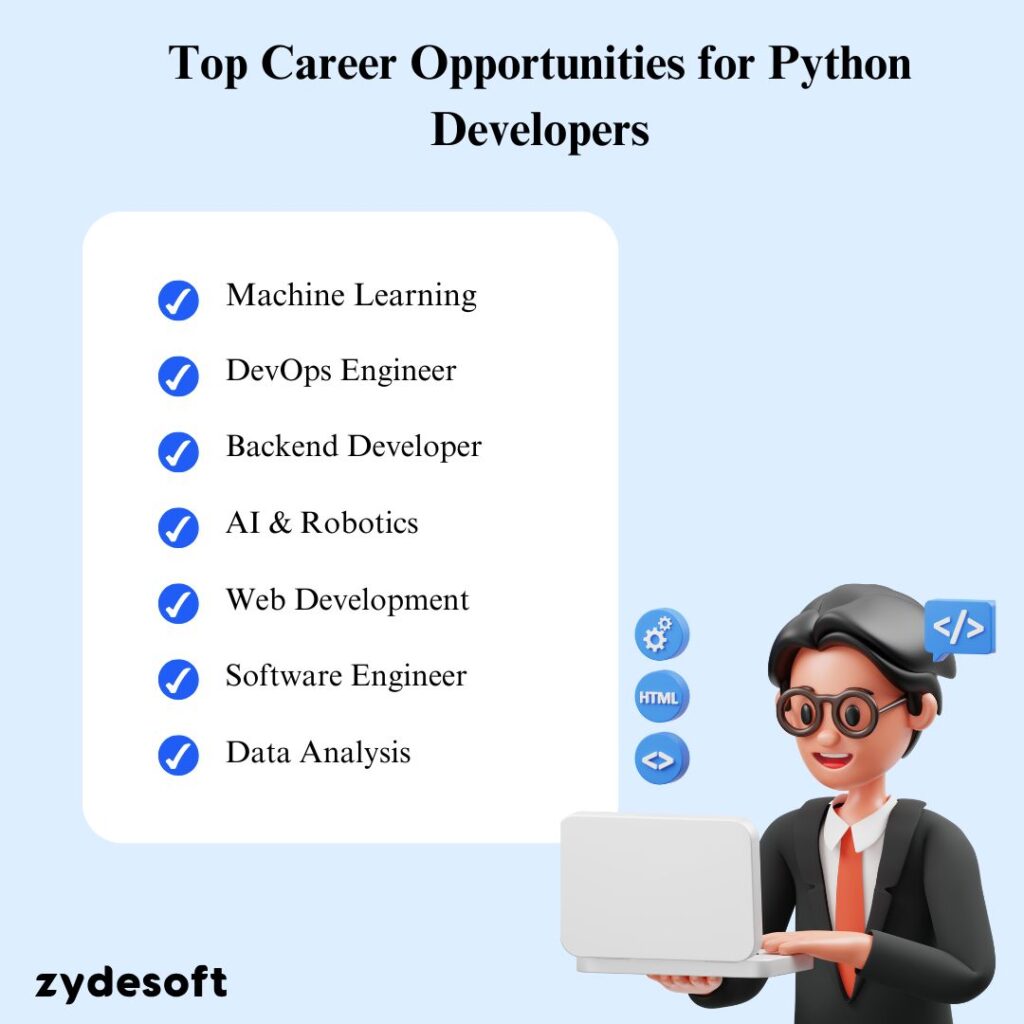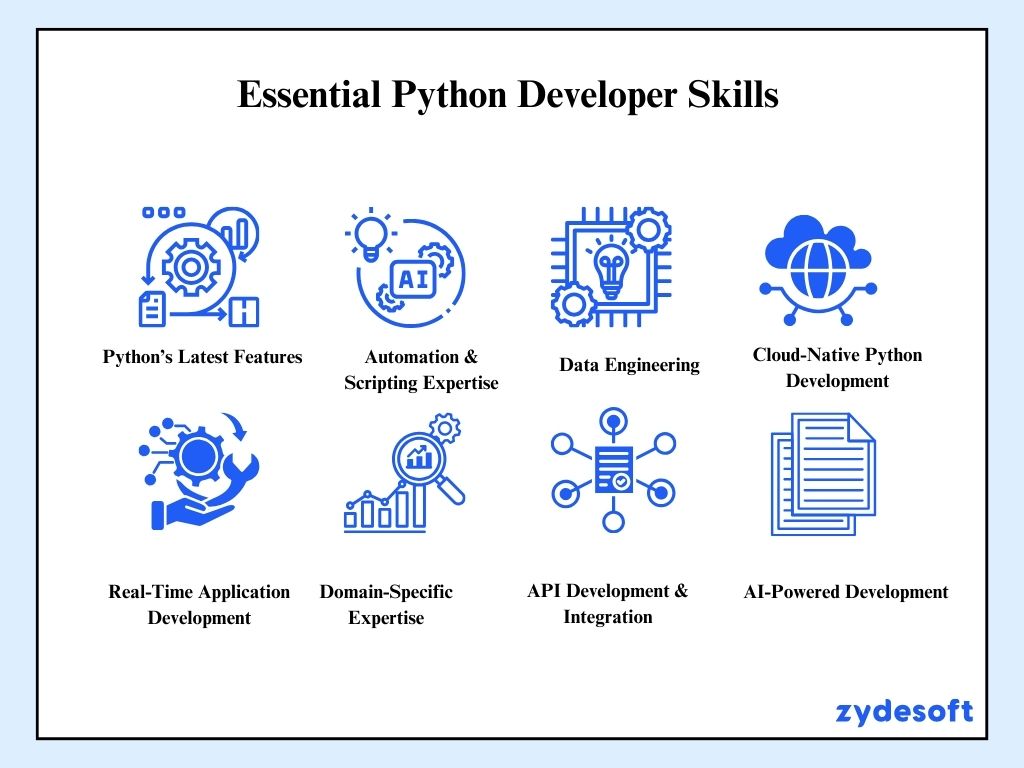
Python has become one of the most popular programming languages, powering everything from web development to artificial intelligence. With over 8 million developers worldwide and a top spot in the TIOBE Index, Python’s demand continues to soar. As businesses look to stay competitive, hiring skilled Python developers is crucial. In this blog, we’ll explore the required Python developer skills, including both technical and soft skills, to help you understand what’s needed to succeed as a Python developer in 2025.
Python is a high-level, interpreted programming language known for its readability and versatility. Developed in the late 1980s, it is widely used in web development, data analysis, artificial intelligence, machine learning, and automation. Python’s simple syntax makes it easy for developers to write clean and efficient code. It also boasts an extensive library ecosystem, including frameworks like Django and Flask for web development, and Pandas and NumPy for data science. As Python continues to grow in popularity, mastering Python developer required skills is crucial for developers looking to excel in today’s tech-driven world.
Python developers are in high demand worldwide, with opportunities spanning tech startups, Fortune 500 companies, and everything in between. As industries embrace digitization and technologies like IoT, AI, and Industry 4.0, Python developer skills required for these advancements are becoming a cornerstone for innovation.
According to experts, the Python market is expected to surpass $100.6 Million in 2030, growing at a compound annual rate of 44.8%. This unprecedented growth opens the door to lucrative career opportunities across industries, making a strong Python developer skill set essential for those looking to build a successful career in this field.
A Python developer writes, tests, and maintains Python code to build software applications, websites, and systems. Depending on their specialization, their role may involve working on backend services, integrating APIs, or building machine learning models. Having the right skills required for a Python developer is essential to excel in these tasks.
Python developers must have a strong understanding of both hard and soft skills to perform at their best. Let’s take a deeper look at the skills required for Python developers.
While technical skills are critical, Python developers’ soft skills can make all the difference in a team’s success. These skills help developers collaborate effectively, solve complex problems, and deliver high-quality software.
Developers who have expertise in both soft and hard skills required for Python developer for effective teamwork and problem-solving can build a strong and developed career in the growing tech industry.

To excel as a Python developer, mastering a diverse set of technical skills is essential. A well versed Python developer skill set enables professionals to build efficient and scalable applications. Here are some core competencies:
These Python developer skills required to help professionals take on a wide range of projects and deliver high-quality solutions in various industries.
As Python developers advance in their careers, the skills required for each level of expertise evolve. Here’s a breakdown of the key Python developer skills by experience level.
| Experience Level | Key Skills |
| Entry-Level | – Basic Python syntax and data structures |
| – Familiarity with web frameworks like Flask | |
| – Version control with Git | |
| – Basic SQL and database management skills | |
| – Unit testing and debugging | |
| Mid-Level | – Advanced Python concepts (e.g., decorators, generators) |
| – Proficiency in Django or Flask for web development | |
| – Experience with data analysis libraries like Pandas and NumPy | |
| – Working knowledge of front-end technologies (HTML, CSS) | |
| – Familiarity with containerization tools like Docker | |
| Senior-Level | – Expertise in machine learning and AI algorithms |
| – Advanced database management (SQL/NoSQL) | |
| – Knowledge of cloud platforms (AWS, Google Cloud) | |
| – Ability to lead teams and mentor junior developers | |
| – Experience with microservices and APIs |
Python’s simplicity, versatility, and extensive libraries make it a popular choice among developers, opening up diverse career opportunities across industries. Having the right Python developer required skills can significantly enhance job prospects in these roles:

Mastering the required Python developer skills for these roles can help professionals secure high-paying jobs and excel in the ever-evolving tech landscape.
As technology continues to evolve, the role of Python developers is expanding into more advanced and specialized areas. To stay competitive in 2025, developers must go beyond foundational skills and embrace the latest trends and tools. Here’s a closer look at the most advanced and unique Python skills shaping the future:

Staying updated with Python’s newest releases is critical for leveraging its full potential. Features like structural pattern matching, enhanced typing, and performance improvements in recent versions (e.g., Python 3.10+) allow developers to write more efficient and expressive code. Advanced proficiency includes understanding how these updates optimize large-scale applications and integrating them into existing projects seamlessly.
Python remains the go-to language for automation, especially in DevOps and IT workflows. Advanced developers are now expected to automate complex processes like CI/CD pipelines, infrastructure as code (IaC), and large-scale data migrations. Using tools such as Ansible, Selenium, and custom Python scripts, developers can significantly reduce manual effort and improve operational efficiency.
Data engineering is becoming a core skill for Python developers, as companies rely on robust pipelines for data-driven decisions. Proficiency in frameworks like Apache Airflow, Dask, and PySpark is essential for building scalable ETL pipelines. Developers must also handle large datasets efficiently, optimize storage solutions, and ensure seamless data integration across platforms.
Cloud computing is at the forefront of modern development. Python developers need to build applications optimized for serverless environments, such as AWS Lambda, Google Cloud Functions, and Azure Functions. Expertise in cloud-native patterns like microservices, containerization (Docker, Kubernetes), and distributed systems ensures scalable and resilient applications.
Real-time applications, such as chat systems, multiplayer gaming, and live-streaming platforms, require advanced Python skills. Mastery of libraries like asyncio, WebSockets, and frameworks like FastAPI is crucial. Developers must also understand event-driven programming and optimize latency to provide smooth, real-time user experiences.
Specialization in industries like healthcare, fintech, or gaming can set developers apart. For instance:
Building high-performance, scalable APIs is a must-have skill. Developers should master advanced frameworks like FastAPI and GraphQL, which enable rapid API development with minimal overhead. Skills in API security, rate-limiting, and monitoring are increasingly vital to ensure robust integrations and user data protection.
Python’s role in artificial intelligence is expanding into new territories. Beyond TensorFlow and PyTorch, developers are now expected to leverage pre-trained models and integrate AI services like OpenAI’s GPT or Google Cloud AI into applications. Advanced skills include fine-tuning models, deploying AI solutions to production, and integrating AI into workflows like customer support or predictive analytics.
If you’re looking to improve your Python developer required skills or stay updated with industry trends, here are some top resources:
What it is: Coursera partners with universities and organizations to offer Python courses, certifications, and degree programs. Many of its courses are taught by professors from prestigious institutions.
Why it’s valuable: Coursera’s courses combine academic rigor with real-world projects, offering widely recognized certifications. Python courses are often part of broader specializations in data science, AI, or software engineering, making them ideal for career advancement.
Best for: Professionals who want to earn accredited certifications or pursue advanced Python develoepr skills as part of a university-led program.
What it is: Udemy is a massive online learning platform with thousands of courses on Python development. These courses are created by individual instructors and range from beginner to advanced levels.
Why it’s valuable: The platform’s variety is unmatched, offering Python courses that cater to specific interests like data analysis, automation, web development, or machine learning. Most courses are affordable and include lifetime access, enabling learners to revisit content as needed.
Best for: Learners seeking flexibility, a broad range of topics, or affordable options for Python courses tailored to specific goals.
What it is: Codecademy is an interactive online platform offering beginner-friendly programming courses, including Python. Its hands-on learning approach allows users to write code directly in their browser while completing lessons.
Why it’s valuable: Codecademy stands out because of its interactive exercises, immediate feedback on coding tasks, and a curriculum designed to teach Python fundamentals quickly. It also offers a structured path for mastering Python, covering topics like loops, functions, and object-oriented programming.
Best for: Beginners who prefer interactive, project-based learning and want to build foundational Python skills quickly.
What it is: Udacity is an online learning platform specializing in tech and programming-related nano degree programs, including Python. Their Python-focused courses are often part of broader data science, AI, and web development tracks.
Why it’s valuable: Udacity offers in-depth content taught by industry professionals. Its nano degree programs combine video lessons, practical projects, and mentorship opportunities. This structured approach ensures learners not only understand Python but also gain real-world skills.
Best for: Intermediate learners or career changers aiming for in-depth, job-ready Python skills with a focus on practical application.
What it is: DataCamp is an e-learning platform focused on data science, analytics, and programming. Its Python courses emphasize data manipulation, visualization, and machine learning.
Why it’s valuable: DataCamp’s platform offers interactive exercises, quizzes, and real-world projects to teach Python in a data-centric context. Its focus on practical, hands-on coding makes it a top choice for aspiring data scientists and analysts.
Best for: Aspiring data scientists and analysts looking to build Python skills with an emphasis on data manipulation and visualization.
These resources, combined with consistent practice and hands-on coding, can significantly boost your Python developer skills and help you stay ahead in the fast-evolving tech industry.
Becoming a proficient Python developer requires a balance of hard and soft skills. With a solid understanding of both technical tools and interpersonal abilities. Developers can contribute to the creation of cutting-edge software and applications. By mastering the skills listed in this article, you will not only meet the current demand for Python developers. Still, you will also position yourself to lead in the future of programming.
If you’re hiring or planning to become a Python developer in 2025, focus on the essential skills outlined here to remain competitive in the ever-growing tech industry.
FAQs
How can I improve my Python skills after mastering the basics?
Practice by working on projects, solving coding challenges, and contributing to open-source, which will help solidify your Python skills. Additionally, focusing on Python developer required skills, such as automation, API development, and cloud computing, can help you advance further.
What advantages come with learning Python development?
Learning Python opens up career opportunities in fields like web development, data science, AI, and automation, making it a versatile and valuable skill.
Why is technical expertise essential for Python developers?
Technical expertise helps Python developers write efficient code, solve complex problems, and build scalable solutions across various industries.
Can I learn Python development without any prior programming experience?
Yes, Python’s simplicity and readability make it ideal for beginners, and with dedication, anyone can master the language. As you progress, focusing on the Python developer skills required, such as object-oriented programming, debugging, and data structures, will help you build a strong foundation.